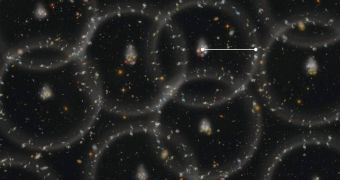Experts working with the Baryon Oscillation Spectroscopic Survey (BOSS) announced on Wednesday, January 8, that they were able to refine measurements of the scale of the Universe to an accuracy degree of 1 percent, marking the most sensitive measurements of this type ever produced.
The BOSS team was led by principal investigator David Schlegel, who holds an appointment with the Physics Division at the US Department of Energy's (DOE) Lawrence Berkeley National Laboratory (Berkeley Lab), in California.
The group says that refining this measurement is one of the most important steps to take in figuring out the true nature of dark energy, the stuff believed to account for around three quarters of the Universe's mass-energy budget. Regular (baryonic) matter accounts for around 4 percent of this budget, whereas dark energy makes up around 23 percent of it.
The achievement marks considerable progress in the field of astrophysics, the team comments. No more than 20 years ago, experts used to debate the scale of the Universe around values that were different by as much as 50 percent. Now, this uncertainty is reduced to just 1 percent.
“One-percent accuracy in the scale of the Universe is the most precise such measurement ever made. Five years ago, we’d refined that uncertainty to five percent; a year ago it was two percent. One-percent accuracy will be the standard for a long time to come,” Schlegel explains.
Details of the new study have been published online on the preprint server arXiv, and have also been submitted for publication in an upcoming print issue of the esteemed scientific journal Monthly Notices of the Royal Astronomical Society
BOSS is based at the Apache Point Observatory in New Mexico, where it uses the Sloan Foundation Telescope to map the night sky. This study, which began in 2009 and will conclude in June, represents the largest program in the third Sloan Digital Sky Survey (SDSS-III).
“The BOSS data are awe-inspiring, but many other pieces had to be put into place before we could get what we’re after out of the data,” says researcher Martin White, a Berkeley Lab team member who is also based at the University of California in Berkeley.
“We made thousands of model universes in a computer, and then observed them as BOSS would do and ran our analysis on them to answer the questions of ‘What if’?” concludes the expert, who is the chair of the BOSS science survey team.

 14 DAY TRIAL //
14 DAY TRIAL //